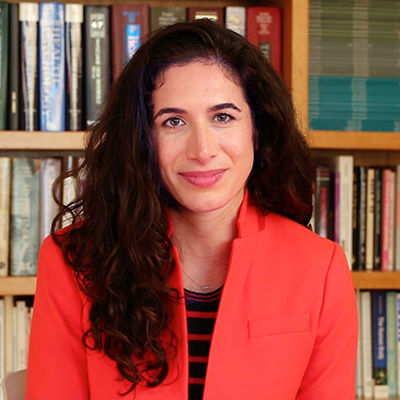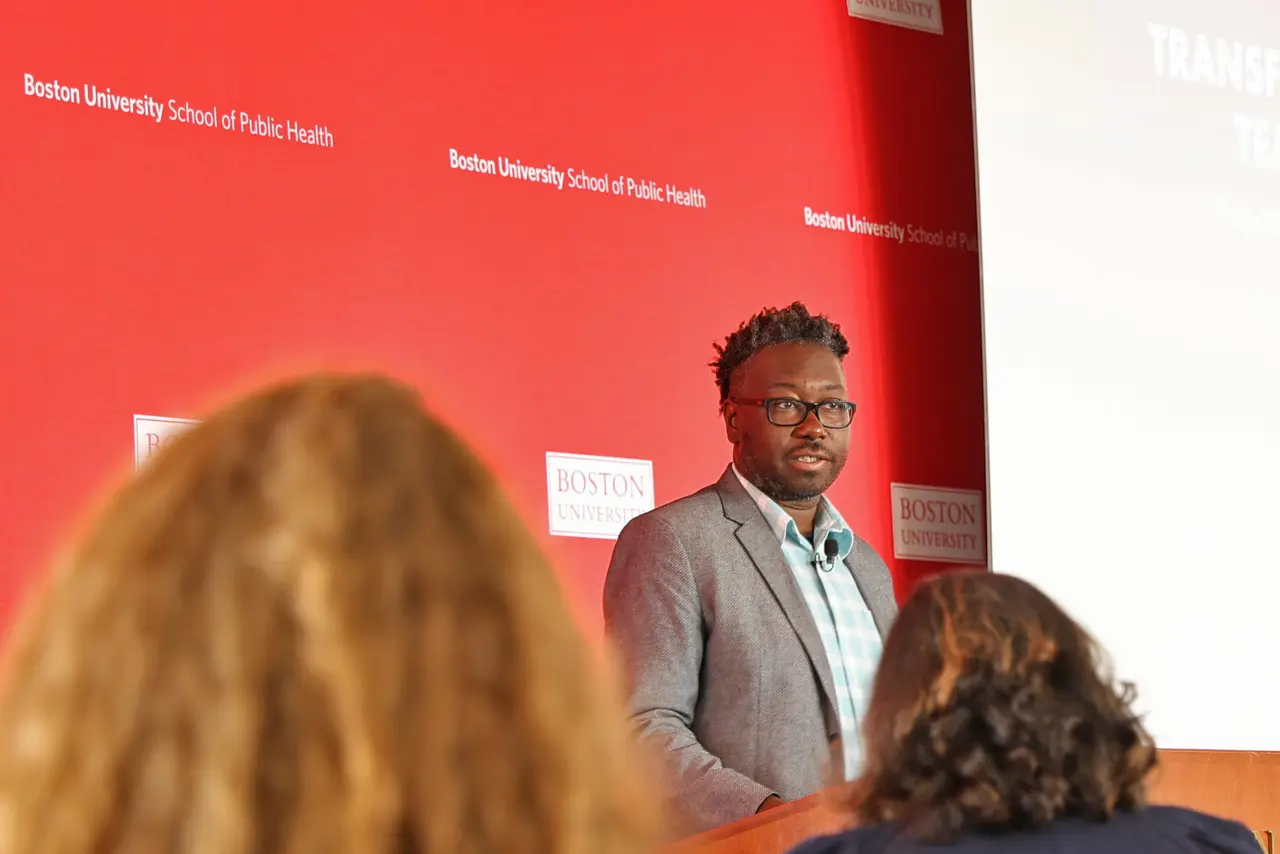Videos
Agenda
Session 1: The mental and physical health effects of trauma and PTSD
Presentations From:
BREAK
Session 2: Placing trauma in a social determinants of health framework
Presentations From:
Speakers

Rachel Sayko Adams
@RSayko_Adams
Senior Scientist, Institute for Behavioral Health at the Heller School for Social Policy & Management Brandeis University
Rachel Sayko Adams, PhD, MPH is a Senior Scientist at the Institute for Behavioral Health at the Heller School for Social Policy & Management at Brandeis University and a proud alum of Boston University’s School of Public Health where she completed her Master’s in Public Health. She is a health services researcher with expertise examining co-occurring substance use and mental health conditions following traumatic brain injury in military/Veteran and civilian populations, with a particular focus on at-risk alcohol use and prescription opioid use. Dr. Adams is the Co-PI of the INROADS study at Brandeis, Intersecting Research on Opioid Misuse, Addiction, and Disability Services, which is examining the intersection between addiction, disability, and service provision in an effort to address the rise of opioid use disorders among people with disabilities, funded by the National Institute on Disability, Independent Living, and Rehabilitation Research. She is a MPI of an R01 from the National Institute of Mental Health which is integrating data from the Department of Defense and Veterans Health Administration to enhance suicide prevention efforts for military members returning from deployments using machine learning. Dr. Adams has an appointment as a health services researcher with the Veterans Health Administration Rocky Mountain Mental Illness Research Education and Clinical Center in Aurora, Colorado.

Kathryn Magruder
@MUSChealth
Professor, Medical University of South Carolina

Juliette McClendon
@wearebighealth
Director of Medical Affairs, Big Health

Jennifer Sumner
@SumnerStressLab
Assistant Professor, Department of Psychology, University of California, Los Angeles
Dr. Jennifer Sumner is a clinical psychologist and Assistant Professor of Psychology at the University of California, Los Angeles (UCLA). She is the Director of the Sumner Stress Lab at UCLA, and her program of research lies at the intersection of the psychological and physical health consequences of trauma exposure. The work of the Sumner Stress Lab examines how experiences of trauma and severe stress relate to accelerated aging and risk for chronic disease, with a particular focus on cardiovascular disease—the leading cause of death and disability worldwide. The goal of this research is to delineate the pathways by which trauma and severe stress get embedded under the skin to contribute to poor health and to use this information to develop targeted interventions to offset risk for adverse health outcomes after trauma. Dr. Sumner received her Bachelor’s degree in Psychology from Pomona College and her Masters and PhD in Clinical Psychology from Northwestern University. She completed her predoctoral internship program at the Charleston Consortium (Traumatic Stress Track) and received postdoctoral training as an Epidemiology Merit Fellow at the Columbia University Mailman School of Public Health. Prior to joining UCLA, Dr. Sumner was an Assistant Professor of Behavioral Medicine at the Center for Behavioral Cardiovascular Health at Columbia University Medical Center.

Jaimie Gradus
@jaimiegradus
Associate Professor of Epidemiology, Boston University School of Public Health
Jaimie L. Gradus is an Associate Professor of Epidemiology at Boston University School of Public Health and an Associate Professor of Psychiatry at Boston University School of Medicine. She received her BA in psychology from Stony Brook University, her MPH with a concentration in epidemiology and biostatistics and DSc in epidemiology at Boston University and her DMSc at Aarhus University. Dr. Gradus’s research interests are in the epidemiology of trauma and trauma-related disorders, with a particular focus on suicide outcomes. She was the winner of the 2009 Lilienfeld Student Prize from the Society for Epidemiologic Research for her paper on the association between PTSD and death from suicide in the population of Denmark. Dr. Gradus has been the recipient of multiple National Institute of Mental Health and foundation grant awards to conduct psychiatric epidemiologic research in both veterans and the general population.

Maryam Jernigan-Noesi
@Jernigma
Founder, Jernigan & Associates Psychology and Educational Consulting
Addressing the needs of diverse youths, adults, and families has been the primary focus of Dr. Jernigan-Noesi’s work as a clinician and scholar. She recognizes that not all traditional psychological approaches that serve to meet the needs of some, are effective for persons from all backgrounds. Dr. Jernigan-Noesi prides herself on the integration of context, culture, and social factors that may influence health and wellbeing. Clinically, Dr. Jernigan-Noesi has worked alongside a multidisciplinary team of health providers in inpatient and outpatient mental health, community, medical, and academic settings. She has extensive training in pediatric psychology and adolescent health, as well as specialized training in adult and family interventions.
Dr. Jernigan maintains a private practice serving a diverse clientele with a range of clinical concerns including, but not limited to: treatment of eating and weight concerns, mood disorders, anxiety, trauma, grief and loss, relational concerns, and career coaching. She also provides couple counseling focused on major life transitions such as, marriage and parenting. Her approach to therapy utilizes an intersectional framework emphasizing the role of identity (e.g., racial identity, sexual identity, gender identity) and culture in mental health and wellbeing.

Renee Johnson
@renee_m_johnson
Associate Professor, Johns Hopkins Bloomberg School of Public Health
Dr. Renee M. Johnson is an Associate Professor and Vice Chair for Diversity, Equity, and Inclusion in the Department of Mental Health at the Johns Hopkins Bloomberg School of Public Health. She earned her MPH and PhD at the University of North Carolina Gillings School of Global Public Health, and conducted post-doctoral studies at Harvard TH Chan School of Public Health. At Hopkins, she is core faculty with the Center for Adolescent Health and the Center for Injury Research & Policy. Dr. Johnson has more than 100 publications addressing adolescent health, and is on the editorial board for JAMA Pediatrics. Her areas of expertise include: substance use among adolescents and emerging adults; violence and injury prevention; and evaluating the public health response to the overdose crisis. Much of her work addresses how adversity and social inequity shape behavioral health. She works with behavioral surveillance data (e.g., CDC’s Youth Risk Behavior Survey, SAMHSA’s National Survey on Drug Use & Health), as well as with morbidity and mortality data (e.g., State Unintentional Drug Overdose Reporting System, or SUDORS). Dr. Johnson is deeply engaged in training the next generation of public health professionals. She teaches a course on substance use epidemiology and directs a NIDA-funded training program for doctoral and post-doctoral students studying the epidemiology of substance use.

Emily Mendenhall
@mendenhall_em
Professor, Edmund A. Walsh School of Foreign Service, Georgetown University
Emily Mendenhall, PhD, MPH is a medical anthropologist and Professor at the Edmund A. Walsh School of Foreign Service at Georgetown University. She has published widely at the boundaries of anthropology, psychology, medicine, and public health and is the inaugural co-editor-in-chief of Social Science and Medicine—Mental Health. Dr. Mendenhall led a Series of articles in on Syndemics in The Lancet in 2017, and was awarded the George Foster Award for Practicing Medical Anthropology by the Society for Medical Anthropology. She has published several books, including Rethinking Diabetes: Entanglements with Trauma, Poverty, and HIV (2019), Syndemic Suffering: Social Distress, Depression, and Diabetes among Mexican Immigrant Women (2012), and Global Mental Health: Anthropological Perspectives (2015). Her newest book is Unmasked: COVID, Community, and the Case of Okoboji.

John Pamplin
@JohnPamplinII
Assistant Professor and Faculty Fellow, New York University
John R. Pamplin II is an “Assistant Professor/Faculty Fellow” in the NYU Center for Urban Science and Progress and with the Center for Opioid Epidemiology and Policy at the NYU Grossman School of Medicine. Dr. Pamplin’s research studies the consequences of structural racism and systemic inequity on mental health and substance use outcomes. His program of research includes work identifying the social and structural drivers of racial patterns in DSM diagnosed major depression, as well as work evaluating policy interventions for the opioid crisis in terms of their potential to either alleviate of exacerbate racial inequities in overdose and criminal legal system outcomes. Prior to joining NYU, Dr. Pamplin received his PhD in Epidemiology from the Columbia University Mailman School of Public health, where he was a predoctoral fellow in the Department of Epidemiology’s National Institute of Mental Health-funded Psychiatric Epidemiology Training program. Upon graduation, Dr. Pamplin received the Bill Jenkins Award (formerly the William Farr Award) for commitment to addressing the causes of social inequalities in health and promise in the field of Epidemiology. Dr. Pamplin also holds an MPH in Epidemiology from Columbia University, as well as a BS in Biology from Morehouse College, and currently serves as President of the Student and Postdoc Committee of the Society for Epidemiologic Research.

Paula Schnurr
@VA_PTSD_Info
Executive Director, National Center for PTSD and Professor of Psychiatry, Geisel School of Medicine

Subscribe to PHC
Get the latest from Boston University School of Public Health



